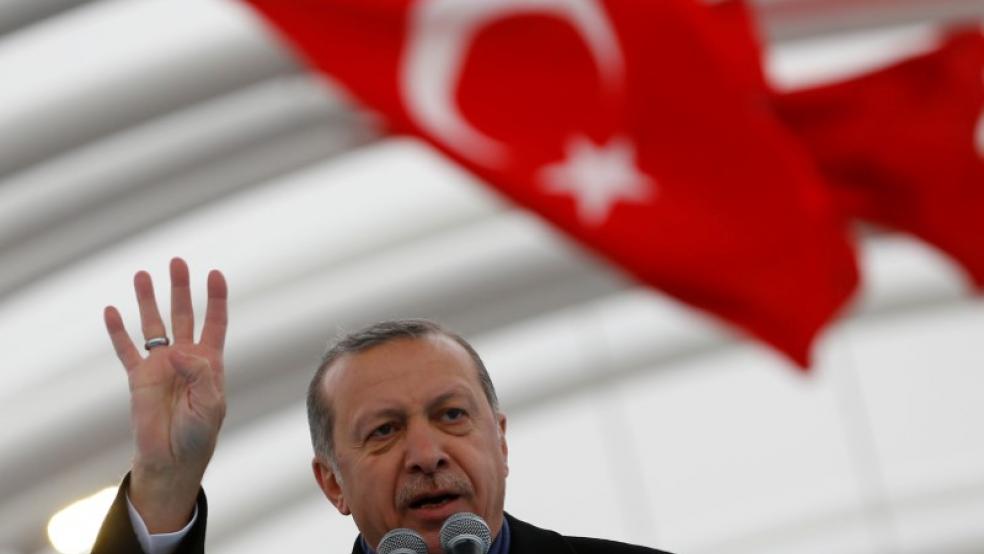With a turnout that exceeded 85 percent, Turkish voters have approved 18 constitutional amendments that will shift the nation from a parliamentary system to an executive presidential system, although by only a narrow 51.3 percent margin.
The result remains at least technically in doubt, since opponents are challenging it, supported by charges from international observers of serous ballot irregularities. But the likelihood of a reversal is small, since the election machinery is under the control of the very person who set up the referendum and who will benefit the most from its outcome: President Recep Tayyip Erdoğan.
It won’t be until after a general election in November 2019 that the changes in the Turkish constitution will be fully implemented. But assuming Erdoğan and his ruling party, the AKP, once again dominate the vote, Turkey will have a president who controls the executive, legislative and judiciary branches of government. The nation will never be the same again.
Related: Trump and Top GOP Voice on Foreign Relations Are at Odds Over Turkey
The vote was actually much closer than Erdoğan expected. For the first time since 2002, his party lost Istanbul and Ankara as well as other big cities like Antalya, Adana and Mersin that were once considered the AKP’s “castles.” Despite having its leaders under arrest, the main opposition party, the HDP, scored successes in the East and Southeast where Kurdish residents delivered large “No” votes. Young, educated, urban Turks voted “No” regardless of previous political loyalties. And with just two exceptions, Turkey’s industrial, tourism and cultural centers — all of which have suffered economically over the last two years — delivered significant “No” votes.
But very much like the Brexit vote in the United Kingdom, conservative, rural and relatively underdeveloped regions of Turkey strongly supported the proposed amendments, and that was the decisive factor. Apparently, most “Yes” voters never focused on the content of the amendments. They were moved by their unconditional support of Erdoğan and the AKP.
The referendum came at a time when tensions were already high. Over the last four years Turkey has gone through one round of local elections, one parliamentary election and two referendums. There have been numerous terrorist attacks. And ever since a failed military coup last year, the nation has been living under a state of emergency, with mass firings and arrests of suspected sympathizers. Just four days after the referendum, the state of emergency was extended for another three months.
Related: Opponents Seek to Annul Turkish Vote as Erdogan's New Powers Become Reality
Furthermore, the Turkish economy is in a fragile state. The minister of finance, Naci Agbal, has announced a stimulus program of fiscal measures and incentive packages that will be submitted to parliament in the coming weeks. But to achieve a real recovery, Turkey needs to normalize its political and economic relationship with the West, and that unfortunately will take longer than hoped because of upcoming elections in several countries, particularly France and Germany.
Meanwhile, negotiations to revise Turkey’s customs agreement with the European Union are ongoing, as are discussions concerning Turkey’s deal with the EU to shelter Syrian refugees who might otherwise flood into Western Europe. And although it is not a member of the EU, Turkey still wants its citizens to have the free movement within Europe’s Schengen zone that EU citizens enjoy.
The most immediate issues are capital punishment and Turkey’s long-stalled application to become a member of the EU. If the Turks reinstate capital punishment, they can say goodbye to their EU aspirations, which could send shockwaves through the economy.
Related: European Leaders Say Vote Shows 'Deeply Divided' Turkey
As for the relationship with the Trump administration, it’s still a work in progress. True, President Trump was quick to congratulate Erdoğan on his referendum victory. And just since January, Turkey has seen visits from Secretary of State Rex Tillerson and officials from the Defense Department, CIA and Joint Chiefs of Staff.
But those contacts were apparently limited to security concerns and failed to touch on the most significant issue for the Turks — the extradition of Fettullah Gulen, the self-exiled cleric whom Erdoğan blames for the 2016 coup attempt. If the administration refuses to extradite Gulen, even if it is for valid reasons, it could dampen U.S.-Turkish relations in the Trump era.
Erdoğan and the AKP may have won the referendum, but this is one of those “be careful what you wish for” situations. Assuming he is reelected in 2019, Erdoğan will be solely responsible for Turkey’s fate, and that is an enormous burden, since the only real determining factor in Turkish politics is how poor or well-off people feel they are. With a weak economy that is vulnerable to countless shocks, AKP supporters could quickly turn on their party and its leader.
What kind of shocks? Domestic demand is falling. So is foreign investment. There aren’t any state assets left to privatize. Tens of thousands of Turks — many of them skilled, educated workers — are unemployed or behind bars because of the post-coup purges. Terrorist attacks committed by both ISIS and a radical Kurdish organization, the PKK, are a constant threat.
Meanwhile, the civil war in next-door neighbor Syria remains an intractable problem. America’s reliance on Kurdish troops to fight ISIS is a challenge for Erdoğan, who fears it will strengthen the Kurds’ drive for independence. The Cyprus conundrum remains unsolved — and the list of problems goes on and on.
To its advantage, the AKP after 15 years in power is a very well-oiled machine. It has shown time and again how quickly it can adapt to a changing political climate. As badly polarized as Turkish society may be, it is at least conceivable that Erdoğan and the AKP will surprise everyone and turn the current situation around to the country’s benefit.





